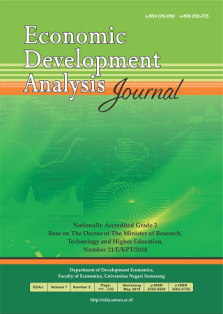The Analysis of Monetary Transmission Mechaniscm by Expectation Patterns in Influencing the Inflation
Abstract
Bank Indonesia set inflation targeting framework from 1 July 2005 by publicizing the inflation target or forward inflation to the public. However, the phenomenon show that most of the actual inflation of Indonesia is not in accordance with inflation targeting that have been set by Bank Indonesia. The purpose of this research is to analyze and know the flow of monetary policy transmission mechanism of expectation line in influencing inflation, to analyze and to know the influence of long-term and short-term and the shocks of interest rate, exchange rate, inflation expectations, output gap and GDP on inflation in Indonesia. The variables used in this research are BI Rate, Exchange Rate, Inflation Expectation, Output Gap, GDP and Inflation. The data used in this research is monthly data of time series from January 2006 until June 2016 which come from Bank Indonesia (BI) and Central Statistic Agency (BPS). The method used in this research is Vector Error Correction Model (VECM). The result of research indicates that: The flow of monetary policy transmission mechanism of expectation line in influencing inflation in Indonesia runs continuously with indicated the existence of two-way relationship between exchange rate and inflation variable, in the short term, the BI Rate, Exchange Rate and Output Gap are significant and positively affect inflation, inflation expectation variables are significant and affect inflation and GDP variable is insignificant to inflation in Indonesia, while in long run variable affecting inflation rate are BI Rate and inflation expectations, based on the variance decomposits result shows that the biggest variant contributing to inflation in Indonesia is the BI Rate.


